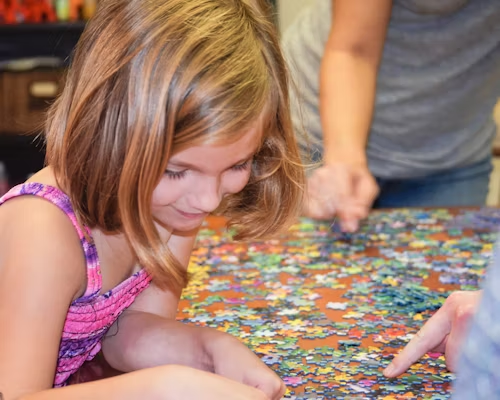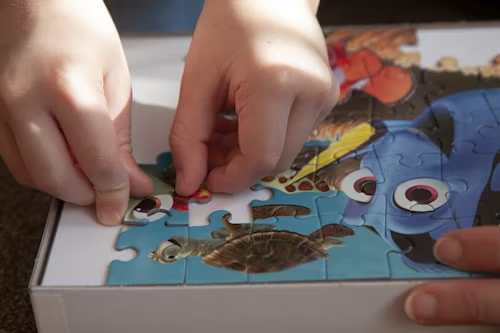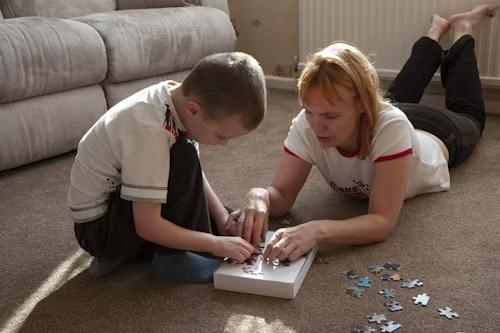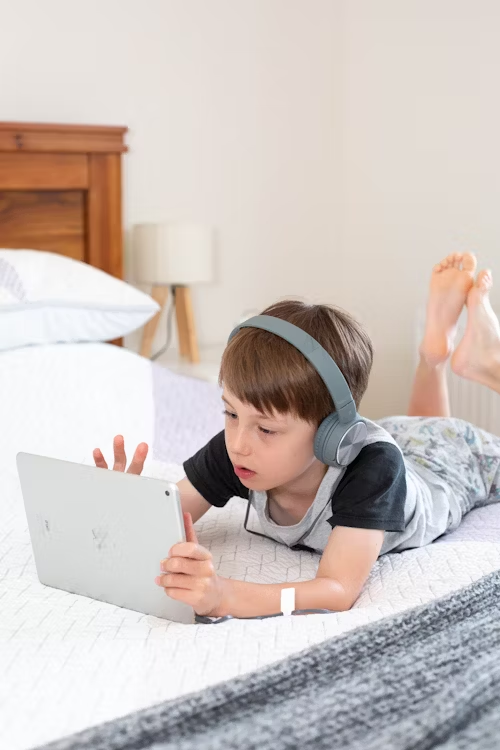
Toddlers exude boundless energy and an insatiable curiosity, often embarking on indoor and outdoor imaginative adventures. Yet, there are days when providing the right environment becomes essential for their growth. For those moments, engaging activities like puzzles prove invaluable. Classic puzzle games offer an ideal platform for fostering young children’s cognitive development, problem-solving skills, and fine motor abilities. With many options available, choosing excellent puzzles can be daunting. However, fear not! We’ve curated a selection of five perfect toddler puzzle tips, ranging from traditional wooden jigsaws to shape-sorting and alphabet puzzles, to cater to every child’s learning and entertainment needs.
Toddler Puzzle Tips: The 5 Perfect Puzzle Toys for Learning!
Here are five puzzles that entertain your toddler and aid in their development:
Floor Puzzles
Floor puzzles are an invaluable gateway to playful learning experiences, offering a captivating journey into the world’s wonders for young explorers. These oversized jigsaw puzzles captivate children’s attention and serve as potent tools for developmental growth. As toddlers engage with these puzzles, they embark on a multifaceted journey of discovery, honing their fine motor skills, problem-solving abilities, and hand-eye coordination. The tactile nature of floor puzzles provides a sensory-rich experience, allowing children to immerse themselves fully in the process of exploration and discovery.
Diving into the world of floor puzzles unveils a vast landscape of options, each uniquely designed to cater to young learners’ diverse needs and preferences. From vibrant animal scenes to captivating alphabet arrays, the array of puzzle themes sparks curiosity and invites exploration. Moreover, the varied complexity levels ensure that children of all ages and skill levels can find puzzles suited to their developmental stage, fostering a sense of challenge and accomplishment with each completed puzzle.
Beyond the physical and cognitive benefits, floor puzzles offer a treasure trove of educational opportunities. As children engage with the puzzle pieces, they refine their motor skills and absorb essential concepts such as shapes, colors, numbers, and more. The interactive nature of these puzzles transforms learning into a dynamic, hands-on experience, fostering deep engagement and retention. Moreover, the collaborative aspect of puzzle-solving encourages social interaction and teamwork, laying the groundwork for valuable life skills such as communication and cooperation. Essentially, floor puzzles are not just entertainment but potent tools for holistic development, igniting a lifelong love for learning in young minds.
Shape Sorters
Shape sorters emerge as indispensable tools in toddlers’ and preschoolers’ developmental arsenals, offering a captivating blend of entertainment and cognitive growth. These toys are meticulously crafted to nurture fundamental cognitive skills, inviting children on a journey of exploration and discovery. Through sorting and matching, young learners delve into shape recognition, problem-solving, and spatial awareness, laying a sturdy foundation for future academic success.
Encountered in toy shops and advertisements, shape sorters come in various forms, each designed to engage and challenge young minds in unique ways. The quintessential shape sorter typically comprises a box adorned with different-shaped holes, accompanied by corresponding objects awaiting placement. Children eagerly grasp these vibrant pieces, intuitively discerning shapes and maneuvering them into their rightful slots, unlocking the box with each successful match. Moreover, shape sorters extend beyond mere shape recognition, offering opportunities for exploration based on size, color, and other distinguishing features.
As children immerse themselves in the captivating world of shape sorting, they embark on a multifaceted journey of skill development and imaginative exploration. Beyond honing cognitive abilities, shape sorters catalyze creativity and pretend play, empowering young learners to weave intricate narratives and construct imaginative worlds. Through open-ended play, toddlers unleash their creativity, experimenting with different combinations and inventing stories that spring to life through the vibrant shapes at their fingertips. In essence, shape sorters transcend the boundaries of conventional toys, emerging as versatile tools for holistic development and imaginative expression in the formative years of childhood.

Picture Puzzles
Introducing picture puzzles to your toddler’s playtime repertoire adds an engaging twist to their developmental journey. Familiar to many, these puzzles feature images printed on wood or sturdy cardboard, fragmented into pieces akin to a jigsaw puzzle. Each piece holds a fragment of the larger picture, enticing young minds to embark on a captivating quest to piece together the complete image.
The allure of picture puzzles lies in their ability to challenge and stimulate children’s cognitive faculties. As youngsters delve into the task, they confront a delightful problem: identifying and arranging the scattered pieces to recreate the image before them. This process scaffolds problem-solving skills, requiring children to employ logic and spatial reasoning to navigate the puzzle’s intricacies.
Moreover, picture puzzles serve as fertile ground for cultivating essential developmental skills. As children manipulate the puzzle pieces, they hone their fine motor skills, refining their dexterity and coordination with each deliberate movement. Simultaneously, the visual feast presented by the puzzle prompts the development of visual perception skills, empowering children to discern shapes, colors, and patterns within the intricate design. Through this multifaceted engagement, picture puzzles emerge as sources of entertainment and invaluable tools for holistic cognitive growth and skill refinement in childhood.
Maze Puzzles
With their labyrinthine designs and intricate pathways, maze puzzles are an enticing challenge for young adventurers eager to navigate twists and turns. These puzzles typically feature a board adorned with myriad routes and obstacles, presenting children with the thrilling task of charting a course from start to finish. Some sets even incorporate additional challenges, such as collecting treasures or dodging adversaries along the way, further enhancing the excitement of the quest.
Beyond the thrill of the chase, maze puzzles are invaluable tools for nurturing children’s spatial awareness and strategic thinking. As youngsters journey through the maze, they are prompted to discern and evaluate various routes, fostering an intuitive understanding of spatial relationships and honing their planning ability. This cognitive engagement sharpens their problem-solving skills and instills a sense of accomplishment as they conquer each twist and turn.
Moreover, maze puzzles offer a progressive learning experience, allowing children to tackle increasingly complex puzzles gradually. With each triumphant maneuver through the maze, children gain confidence, bolstering their belief in their decision-making abilities and fueling their appetite for further exploration. Through this iterative process of challenge and triumph, maze puzzles become more than just recreational diversions; they emerge as powerful catalysts for fostering creativity, resilience, and cognitive growth in young minds.
Pattern Blocks
Pattern blocks, with their timeless appeal and educational significance, represent more than just toys; they are gateways to a world of discovery and cognitive development. For generations, parents and educators have cherished these enduring puzzles as pillars of early childhood learning.
Pattern blocks are available in various shapes, sizes, and colors, beckoning children to explore creatively and develop intellectually. As little hands manipulate these blocks, children refine their fine motor skills and cultivate a deeper understanding of mathematical concepts, spatial relationships, and problem-solving strategies.
In the preschool classroom, pattern blocks are prominent in the curriculum, serving as versatile tools for engagingly and interactively introducing young minds to fundamental mathematical principles. Beyond academic instruction, these puzzles foster an environment of imaginative play and hands-on learning, empowering children to experiment, innovate, and express themselves freely by creating intricate designs and patterns. With each carefully placed block, children enhance their cognitive abilities and build confidence in their creative potential, laying the groundwork for a lifetime of curiosity and exploration.
Benefits of Puzzles for Toddlers:
Puzzles play a pivotal role in enhancing hand-eye coordination and refining fine motor skills, which are crucial for young children as they navigate the world around them. It transcends mere entertainment, offering families a rewarding activity that fosters collaboration and learning. Whether enjoyed on a rainy day indoors or during quiet moments of exploration, puzzles encourage children to persevere and tackle challenges independently, instilling a sense of pride and accomplishment with each solved puzzle piece. While it may be tempting to assist, allowing children the space to conquer puzzles on their own nurtures their self-confidence and resilience, empowering them to overcome obstacles with confidence.
As children engage with puzzles, they embark on a journey of discovery, honing essential cognitive skills and nurturing a love for learning that will serve them well throughout their lives. Puzzles are timeless treasures in early childhood education, captivate young minds, and facilitate holistic development.

Perfect Puzzles for Toddlers:
Discovering the perfect puzzle for your toddler has always been challenging with our comprehensive selection, ranging from big floor puzzles to personalized wooden designs and everything in between. Whether you are seeking an all-inclusive puzzle set or a chic and customized option, our curated list ensures you find the ideal puzzle tailored to your toddler’s developmental stage.
The Mudpuppy Level Up! Puzzle Set tops our list as the best toddler puzzle, offering four puzzles in one set with varying difficulty levels to engage and challenge young minds. Designed for toddlers three and up, it’s praised for its affordability, durability, and captivating cartoon-themed pieces. For younger tots, the Skip Hop Zoo Park Pals Puzzle, with its sturdy pieces and colorful park scene, stands out as the best puzzle for one-year-olds, encouraging imaginative play and sensory exploration.
Shorten with AI
Moving up in age, the Wee Gallery Pets Beginner Puzzles captivate two-year-olds with their whimsical characters and easy-to-use jigsaw pieces, fostering confidence and creativity. Meanwhile, the Melissa & Doug Dinosaurs 4-in-1 Wooden Jigsaw Puzzles are perfect for three-year-olds, offering stimulating puzzles and convenient storage within the wooden box, facilitating cleanup and organization. For a unique twist on traditional puzzles, the Cucos Wooden Cutting Puzzle delights toddlers with its interactive fruit-themed design, allowing them to “cut” each piece with a wooden knife.
Finally, personalized name puzzles like the BusyPuzzle Personalized Name Puzzle with Animals provide a highly customizable and educational experience, aiding in name recognition and spelling while enhancing motor skills and hand-eye coordination. With our diverse array of puzzles tailored to every developmental stage, you will find the perfect match for your toddler’s learning and entertainment needs.
Conclusion:
Research indicates that puzzles play a significant role in children’s development. Engaging with puzzles can enhance physical abilities, fine motor skills, and the coordination of small muscle groups in babies. Furthermore, children who regularly interact with puzzles tend to demonstrate improved capabilities in drawing, writing, and playing musical instruments. Puzzles not only keep toddlers and preschoolers entertained, but they also serve as practical tools for channeling their energy and curiosity constructively.





